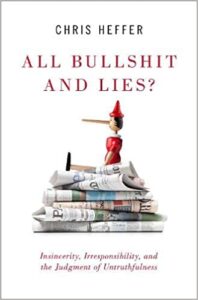In All Bullshit and Lies? Insincerity, Irresponsibility, and the Judgment of Untruthfulness (2020, New York: Oxford University Press), Chris Heffer outlined the TRUST framework for analyzing untruthfulness in everyday life. The key planks of that framework are, firstly, that the concept of untruthfulness needs to include not just insincerity (typified by lying) but also epistemic irresponsibility (typified by bullshit) and, secondly, that it is possible to systematically analyse putative cases of untruthfulness through a simple heuristic. Though simple, that heuristic brings out the categorical and ethical complexity of untruthfulness in situated context. I exemplify the framework primarily through examples from the media and politics, partly because the book was written during the years of Brexit and Trump but also because the forensic contexts merit another book.
In this talk, Heffer will explain how the TRUST framework can be applied to forensic contexts and consider whether the framework needs to be adapted to these contexts. On the one hand, we can easily see at work the major categories of insincerity e.g. the withholding of information in police interrogation; misleading in cross-examination; and the lying enshrined in perjury. On the other, the legal process, like science, is meant to be a bullshit-free zone where the ultimate aim is to achieve evidential accuracy. To some extent this is achieved in court because the highly strategic nature of trial discourse means that untruthfulness is usually deliberate. Yet rape cases flounder due to a first level of epistemic irresponsibility: dogma in the form of entrenched rape myths, which are sincerely but irresponsibly held. And police forces have fallen victim all too often to bullshit techniques and technologies proposed by ‘experts’ who might sincerely believe their inventions.

Leave a Reply